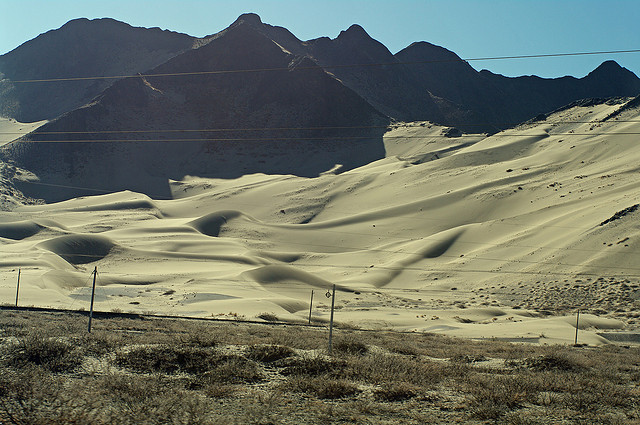This is obviously a problem that will affect unification and something that must be planned for. However, I doubt that we will ever see "the United Nations Convention to Combat Desertification playing a central role in future Six Party Talks." Also we should keep in mind that the cause of this problem or threat is the Kim Family Regime and its bankrupt system that implements economic and agricultural policies that destroy the north Korean environment.
V/R
Dave
The Real North Korean Threat
In North Korea, the threat of desertification should be raised to the same level as nuclear nonproliferation.
By Emanuel Pastreich , September 23, 2013 .

Creeping desertification near Lhasa, Tibet. (treasuresthouhast / Flickr)
There is a terrible danger lurking just over the DMZ that threatens the Republic of Korea and Northeast Asia. That threat demands an immediate response that is focused and forceful, as well as a long-term strategy that will bring together all members of the international community for a campaign dedicated to the permanent containment of this threat.
It is not North Korea’s Taepodong ICBM systems, nor its Musudan or Nodong missiles that I have in mind. Nor do I refer to the nuclear weapons that recently were tested as part of Pyongyang’s high-stakes diplomatic cat-and-mouse game with the international community. Although the danger of an arms race in Northeast Asia is serious, humanity faces another, potentially more devastating peril—one for which we have yet to begin to make required strategic preparations.
I refer to the spread of deserts and semi-desert regions in North Korea as a result of the reckless logging of forests, the misuse of soil, and irresponsible farming practices. These ecological dead zones, where few plants can survive, are spreading. As desertification worsens, this ecological nightmare will have serious, perhaps irreversible, repercussions in South Korea and throughout the region.
Professor Kim Seoung-il of Seoul National University estimates that over 1 million hectares of forests in North Korea have been lost over the last 20 years, leading to a nearly irreversible loss of soil and an endless series of floods and droughts.
This crisis in North Korea is only a more extreme manifestation of widespread trends in Asia, a region that is losing land to deserts more rapidly than Africa. At present almost 500,000 hectares of land are lost to deserts annually in the region, and at least 2.62 million hectares, accounting for 27 percent of the total landmass of China, has been irretrievably lost to deserts. Already, yellow dust carried by the wind to Seoul, and even to regions of Japan, from the spreading deserts of Northeast China has emerged as a serious ecological and health threat.
The loss of soil in North Korea cannot be stopped by B-2 bombers or missile defense systems. In contrast to military threats, these new environmental dangers demand not the isolation of North Korea but direct, long-term international engagement, partnership, and cooperation. The international community must work closely with the citizens, organizations, and government of North Korea to address this threat and must readily lend expertise and support. The world cannot walk away and leave North Korea to continue its destructive practices.
Needless to say, the destabilization of ecosystems from desertification knows no national borders. International distaste for the government in Pyongyang should not blind us to our common interest in combating the spreading deserts in East Asia. Training North Koreans in how to respond to the threat of climate change through effective environmental policies should be our highest priority where North Korea is concerned.
(Continued at the link below)
No comments:
Post a Comment